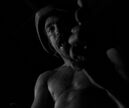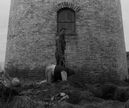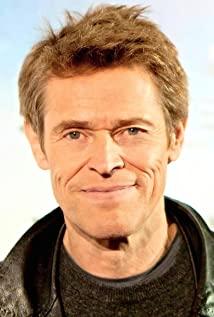The film seems to want to show a psychopath
The film "The Lighthouse" (2019) has the following elements to pay attention to: secrecy, lonely environment, violence and masochism, "tiredness and malice". The combination of these elements can explain that this film is about the theme of mental illness. Then, how is this mental illness developed and how does it occur? For the convenience of expression, the elder lighthouse keepers are called "Old Keepers", and the younger ones are called "Little Keepers".
secret. Under normal circumstances, people are naturally curious about other people's secrets. At the beginning of the film, the old guard also seems to show this unique hobby of human nature. He asks the little guard if he came to this island because of escaping something, but when the old guard finds out When the little guard really wanted to reveal the secret, the old guard instead encouraged him to keep the secret, especially when he found out that the little guard really had a sinful secret, he tried his best to show his disinterest, and when the little guard kept the sinful secret When fully released, he was frightened and fled elsewhere. why? The reason is simple: being able to keep secrets is a sign of a person's normal consciousness, and the so-called "speaking the truth after drinking" is a manifestation of unconsciousness. For the little guards, especially in that environment, the behavior of revealing their sinful secrets is a manifestation of their mental state of madness. Of course, usually, secrets cannot be shared at will. Another possibility of sharing at will is that the sharer has regarded the other party as a living dead. The experienced old guard naturally understood this, and naturally became afraid. The point is that the old guard sees that the young guard's revealing of secrets is a reaction to circumstances similar to the circumstances that produced his sinful secrets. However, he only paid attention to the lonely natural environment, but not to the interpersonal environment where the little guards were abused. That's how tragedy happened.
envirnmental factor. A lonely environment and repetitive work can easily make people tired. Although "tired of being malicious", this is not enough to kill each other. Sometimes, people's social nature requires mutual respect. So, when others can leave hand in hand, why do they feel like this is impossible in the first place? Obviously, the interpersonal environment of sadism and abuse, coupled with their respective personality characteristics, doomed them to cannibalize each other. For little guards with personality disorders, tolerance is limited, but the old guard's behavior has indeed accelerated the onset of mental illness of the little guard. For example, the old guard's indifference to the young guard (such as unscrupulous farting and urinating), bullying (occupying public objects, using privileges to force the young guard to obey orders) and slavery (except for cooking, other chores are borne by the young guard, even including defecation). ), the film is constantly hinting to us that the little guard will break out in this environment as soon as possible. Of course, the little guard's own personality also made him so. In a lonely environment, he can't get along with the only person, and he doesn't want to be kind to the only animal (seagull). In this way, under the combined effect of internal and external factors, he can only go crazy.
mental illness. The reason why the little guard is said to be mentally ill is because after being bullied, he did not simply resist, but wanted to become the bully, not simply to replace him, but to imagine himself as the bully. When a lumberjack in Canada was bullied by a foreman, there were two possible outcomes: (1) His own confession. He said he thought about killing the foreman, but he didn't do it until the foreman was in danger, and he killed the foreman indirectly. He possessed the foreman's labor tools, falsely used the foreman's name, and he directly became the foreman. The reason for this is because after he was bullied, he hated the bullied self, thought that he had no future, and fancied that he was the bully. (2) He actually stabbed the foreman in the back of the head, killing the foreman directly. When he releases his sexuality on the island later, the fast-moving shots are all reflections of his actions and thoughts, which either really happened or are still an illusion. Regardless of the circumstances, the use of the foreman's name may be a result of killing people, because at that time, in the boundless and lonely forest, no one really paid attention to who was who, and the fake foreman could get more benefits. But leaving that place, he still pretends to be a foreman, which can only be said to be the embodiment of a mentally ill person.
When living on the island, the young guard did not know the name of the old guard at first. After being bullied, he thought about changing positions with the old guard until he found out that they were both named Tom, and the desire became stronger. In that chase scene, who was chasing whom, who smashed the lifeboat, and who was trying to kill whom? Why is the factual image the exact opposite of what the old guard said? If it was said that the little guard who had the advantage in strength had no need to escape, the real chaser should be the little guard, and the one who smashed the lifeboat was also the little guard. After the old guard escaped the door in the rainy night, when the young guard chased outside the door, the person lying on the ground was himself. Obviously, he believed that the chaser should be the strong one, the old guard, and the chased should be the weak. He himself; plus the scene where Aquaman is naked and his eyes are discharging light, it seems that Aquaman helped him switch between him and the old guard (this place is really hard to understand, a guess, I hope there is A more reasonable explanation), in this way, the little guard will replace the old guard, and the psychological preparation has been completed. Until the old guard scolded him for being a dog, and before killing the foreman, the foreman also scolded him in the same way. The same environment stimulated the little guard finally broke out and killed the old guard. Until the old guard asks for mercy, he has to prove who is the "dog".
Human factor. If the above guesses are wrong, I would like to explore another minor theme reflected in the film: tiredness produces malice. This can of course explain the murderous thoughts of the little guard and the bullying and domineering behavior of the old guard, but what is more worthy of attention is how the old guard drives the little guard crazy. In addition to the constant abusive external behavior, the old guard also destroyed the younger guard step by step psychologically. When the little guard revealed his true identity, the old guard knew that the little guard had gone crazy, and of course he knew that the little guard's mental state would endanger himself. Then why does he continue to tease the little guard and continue to abuse? One is that the old guard has the experience of killing his former assistant (I don’t know if it is the imaginary of the young guard? The tower guards are mobile, they are switching to other people, so where is the time to kill), he is not afraid; The second is that he wants the young guard To be completely crazy, the so-called "to make it go crazy" is also true. If this guess is correct, the evil of human nature is so desperate. (Text/Slate Planting Flowers Saturday, January 4, 2020)
Ps. Thanks for the Chinese subtitle resources shared by HD MP4!
View more about The Lighthouse reviews











